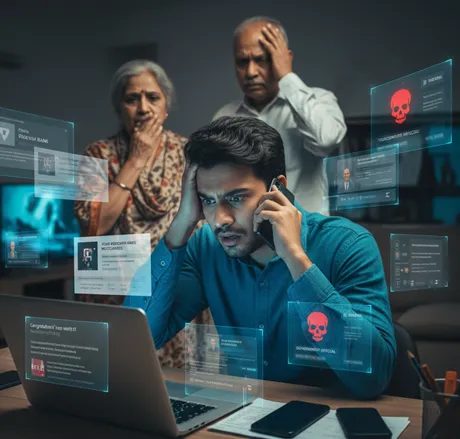
With the growing dependence on phones and the Internet for purposes such as shopping, banking, and socialising, online fraud and cyber crimes are on the rise. Legal provisions to protect citizens are being made by the government under the Information Technology (IT) Act, the Bharatiya Nyaya Sanhita, and other special acts.
Common Types of Online Fraud Acting Nowadays:
- UPI frauds – Scamming fake payment links and stealing money from your bank.
- OTP scams – Somebody calls up as a fake bank officer and asks you for the OTP.
- Job scams - Fake job offers on WhatsApp or email asking for a "registration fee".
- Loan scams – Apps give instant loans and harass users for repayment.
- Social media hacking – Money is asked for using fake profiles or hacked accounts.
- Online shopping– Fake websites/sellers ask for money and do not deliver the item.
- Sextortion – Scammers record private video calls and blackmail for money.
- Credit/debit card fraud – Cloning card details or stealing the card itself for online purchases.
- Fake investment schemes – Big returns are promised through means of crypto or shares, but they all turn out to be fake.
- Phishing emails/SMS – Fake messages from banks/companies asking you to click on a link.
Laws That Protect You:
IT Act, 2000
- Related to hacking, identity theft, data theft, email fraud, online threats, and so on.
- Section 66C - For identity theft.
- Section 66D – For cheating by using computer resources (like OTP fraud or job fraud).
BNS (Bharatiya Nyaya Sanhita), 2023
- Section 318 – Cheating (replaces IPC 420)
- Section 336 – Identity theft
- Section 351 – Criminal intimidation (like threats via loan apps)
Digital Personal Data Protection Act, 2023
- Protects your private data and punishes companies or apps for misuse of your information.
RBI Guidelines
- Banks must help in the event of fraud with your account, especially if you report it at the earliest.
🛡️ What You Can Do:
- Never share OTPs, passwords, or bank details with the other person.
- Avoid clicking on the unknown link or downloading random apps.
- Use hard passwords and keep 2-factor authentication (2FA) on.
- Report all online fraud at cybercrime.gov.in or call 1930 (cyber fraud helpline).
Online Fraud & Cybercrime – FAQs
-
1. I clicked on a link, and the money was deducted from my bank. What should I do first?
-
Immediately report such transactions as a fraud, either by calling your bank or by confirming the fraud at 1930 or by logging on to cybercrime.gov.in.
-
2. Someone called me and pretended to be my bank, taking my OTP. Will I be liable?
-
No. If you report the case on time to your bank or police, you stand a chance of recuperating your funds. The sharing of OTP is questionable, but the law does stand with cybercrime victims.
-
3. I purchased something online and paid for it, but nothing ever arrived. What can I do?
-
You can now report online shopping fraud on cybercrime.gov.in. You can also get in touch with your bank to raise a dispute claim.
-
4. A fake job offer took money from me. Can I get a refund?
-
File a cybercrime report with complete details. Because it is job fraud, it is punishable under the IT Act and BNS.
-
5. I got hacked on WhatsApp, and now they are asking money from my friends.
-
Tell your friends about it as soon as you can and report this account to WhatsApp. Do file a complaint on cybercrime.gov.in as well.
-
6. This loan app is threatening me and messaging my contacts. What do I do?
-
Report to 1930 and Google Play Store if it is an app. This kind of intimidation is a punishable offence.
-
7. A fake Facebook account has been created in my name, using my photos. What can I do about it?
-
Yes! You must convey this to Facebook and also file a complaint for identity theft under Section 66C of the IT Act.
-
8. Is it safe to give my Aadhaar and PAN on this website?
-
Only trusted government or official sites are safe. If you feel any misuse has been made, report it on cybercrime.gov.in.
-
9. A message has popped up that says I've won a lottery, and I need to send money for processing. Is it real?
-
No! This is already a scam. Never send money with regard to any prize claims. Report it.
-
10. My account was hacked, and money was transferred from it. The bank is saying it is not their fault. What next?
-
If you reported the hacking operation quickly, according to RBI guidelines, the bank is obliged to help you. Write a complaint to the ombudsman of your bank.
-
11. A stranger is threatening me with a video of our private video call. What do I do?
-
This case falls under sextortion. Don't pay. Preserve evidence and file a report with the cyber police or lodge an online complaint.
-
12. Someone transacted using my debit card without my knowledge. What is this called?
-
It is called card fraud. Block your card and file an FIR or an online complaint against unauthorised transactions.
-
13. Are there any punishments prescribed for cybercriminals in India?
-
Yes. The IT Act and IPC prescribe imprisonment and financial punishment for hacking, cheating, and blackmail, among others.
-
14. How do I protect myself from online fraud?
-
Use strong passwords; do not click on unknown links; never share OTPs; before making any payment, double-check URLs.
-
15. How do I report cybercrime in India?
-
www.cybercrime.gov.in or helpline 1930, operational in many states.
Add new comment